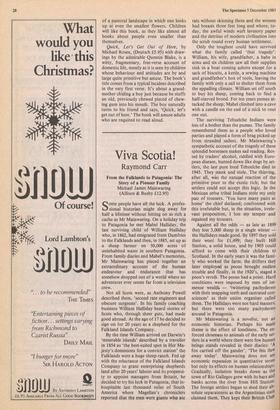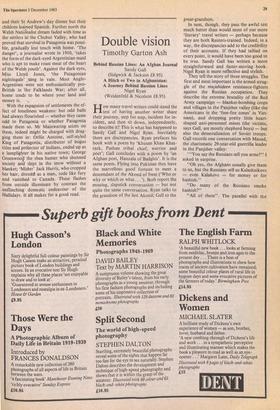Viva Scotia!
Raymond Carr
From the Falklands to Patagonia: The Story of a Pioneer Family Michael James Mainwaring (Allison & Busby £12.95) ome people have all the luck. A profes-
sional historian might slog away for half a lifetime without hitting on as rich a cache as Mr Mainwaring. On a holiday trip to Patagonia he met Mabel Halliday, the last surviving child of William Halliday who, in 1862, had emigrated from Dumfries to the Falklands and then, in 1885, set up as a sheep farmer on 30,000 acres of uninhabited waste in southern Patagonia. From family diaries and. Mabel's memories, Mr Mainwaring has pieced together an extraordinary account of the human endeavour and endurance that has somehow dropped out of a world where no adventurer ever seems far from a television crew.
Not all Scots were, as Anthony Powell described them, 'second rate engineers and obscure surgeons'. In his family coaching business William Halliday heard stories of Scots who, through sheer guts, had made good abroad. At the age of 17 he decided to sign on for 20 years as a shepherd for the Falkland Islands Company.
By the time William arrived on Darwin's 'miserable islands' described by a traveller in 1854 as 'the best-suited spot in Her Ma- jesty's dominions for a convict station' the Falklands were a huge sheep ranch. Fed up with the reluctance of the Falkland Islands Company to grant enterprising shepherds land after 20 years' labour and its propensi- ty to appoint managers from Britain, he decided to try his luck in Patagonia, that in- hospitable last thousand miles of South America where Magellan's chroniclers reported that the men were giants who ate rats without skinning them and the women had breasts three feet long and where, to- day, the awful winds waft lavatory paper and the detritus of modern civilisation into the scrub round every human settlement. Only the toughest could have survived what the family called 'that tragedy': William, his wife, grandfather, a babe in arms and six children saw all their supplies sink in a boat coming ashore except for a sack of biscuits, a kettle, a sewing machine and grandfather's box of tools, leaving the family with only a sail to shelter them from the appalling climate. William set off south to buy his sheep, coming back to find a half-starved brood. For ten years pumas at- tacked the sheep; Mabel climbed into a cave with a candle on the end of a stick to rout one out.
The surviving Tehuelche Indians were less of a bother than the pumas. The family remembered them as a people who loved parties and played a form of brag picked up from stranded sailors. Mr Mainwaring's sympathetic account of the tragedy of these splendid horsemen makes sad reading. Rot- ted by traders' alcohol, riddled with Euro- pean disease, hunted down like dogs by set- tlers, the last pure bred Tehuelche died in 1945. They stank and stole. The thieving, after all, was the natural reaction of the primitive poor to the exotic rich; but the settlers could not accept this logic. In the Mexican selva tribal Indians stole my only pair of trousers. 'You have many pairs at home' the chief declared; confronted with this irrefutable but, in the situation, irrele- vant proposition, I lost my temper and regained my trousers.
Against all the odds — as late as 1899 they lost 3,000 sheep in a single winter the Hallidays made good. By 1897 they sold their wool for £1,499; they built Hill Station, a solid house, and by 1903 could afford to come with their children to Scotland. In the early years it was the fami- ly who worked the farm: the drifters they later employed as peons brought endless trouble and finally, in the 1920's, staged a peon's revolt. The peons had a point. Hard conditions were imposed by men of im- mense wealth. — 'twittering pachyderms with their snapping teeth and castrated con- sciences' as their union organiser called them. The Hallidays were not hard masters; but there were too many pachyderms around in Patagonia.
Mr Mainwaring is a novelist, not an economic historian. Perhaps his main theme is the effect of loneliness. The en' forced closeness to animals of the early set- tlers in a world where there were few human beings stands revealed in their diaries: 'A fox carried off the gander', 'The ibis flew away today'. Mainwaring does not see economic expansion in quantitative tears but only its effects on human relationships. Gradually, isolation breaks down as the
town of Rio Gallegos grew with its bars and banks across the river from Hill Station.
The foreign settlers began to shed their ab- solute separateness as the Argentinian state claimed then). They kept their British Club and their St Andrew's day dinner but their children ledrned Spanish. Further north the Welsh NatiOnalist dream faded with time as the settlers in the Chubut Valley, who had proved that survival in Patagonia was possi- ble, gradually lost touch with home. 'The danger', a journalist wrote in 1910, 'takes the form of the dark-eyed Argentinian maid who is apt to make roast meat of the heart of the Welsh youth'. Against the dark eyes, Miss Lloyd Jones, 'the Patagonian nightingale' sang in vain. Most Anglo- Argentines were not enthusiastically pro- British in the Falklands War; after all, home tends to be where your land and money is. .;
With the expansion of settlements the ef- fect of loneliness weakens: but odd balls had always flourished — whether they came odd to Patagonia or whether Patagonia made them so. Mr Mainwaring seizes on them, indeed might be charged with drag- ging them in: Orllie Antoine, self-styled King of Patagonia, distributor of bogus titles and prOtector of Indians, ended up as a lamplighter in his native town; George Greenwool.the rhea hunter who shunned society and slept in the snow without a blanket; 'Mister' Jack Harris, who cropped her hair, dressed as a man, rode like fury and vanished to Canada. These flashes from outside illuminate by contrast the unflinching domestic endeavour of the Hallidays. It all makes for a good read.















































 Previous page
Previous page